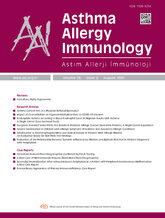


Background and Aim: Coronavirus disease of 2019 (COVID-19), also known as SARS Coronavirus-2, is an infectious disease caused by a single-stranded RNA (ssRNA) virus that emerged in Wuhan, China, in December 2019, leading to a global pandemic. Among the vaccines developed for COVID-19, BioNTech, CoronaVac, and TURKOVAC™ have been administered in Türkiye. While they were the best way to control the pandemic, allergic reactions associated with these vaccines have been reported. We aimed to evaluate the possible risk factors by examining the demographic and clinical characteristics of patients who showed hypersensitivity reactions to BioNTech and CoronaVac vaccines, and especially any concomitant diseases. TURKOVAC™ was not administered to any of the patients who presented to our clinic.
Materials and Methods: This retrospective study included 45 patients who presented with hypersensitivity reactions to COVID-19 vaccines at the Istanbul Faculty of Medicine`s adult allergy clinic. Demographic and clinical characteristics were assessed, as well as whether patients who experienced hypersensitivity reactions subsequently continued vaccination. A control group (CG) of 50 age- and sex-matched individuals without hypersensitivity reactions to COVID-19 vaccines was established for comparison. The severity of hypersensitivity reactions was assessed using the World Allergy Organization (WAO) criteria.
Results: Of the 45 patients, 26 had hypersensitivity reactions to the BioNTech and 19 to CoronaVac vaccines, with 55.6% reporting reactions within the first hour of administration. Compared to the CG, patients with a history of drug allergy, allergic asthma, or allergic rhinitis were more likely to develop hypersensitivity reactions to the vaccines. Drug allergies were identified as a significant risk factor, with an odds ratio (OR) of 8.939 (95% confidence interval [CI]: 3–31, p=0.001). Additionally, allergic asthma (OR: 4.325, 95% CI: 1–18, p=0.042) was associated with an increased risk for hypersensitivity reactions to COVID-19 vaccines.
Conclusion: A history of drug allergy and allergic asthma significantly increased the risk of hypersensitivity reactions to COVID-19 vaccines. However, no significant association was found between clinical features and the severity of the reaction.